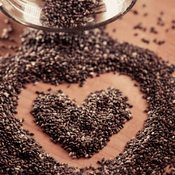 Many of you may not have known much about chia until it became a household word about a decade ago when chia “pets” were everywhere. Remember those terra cotta plant holders in the shape of an animal that grew chia plants out the top of the head? Chia seeds have actually been around since the days of the Aztec civilization when they were used for food, medicine, and currency and were highly valued. Modern health researchers have found that those same chia seeds have a lot of health benefits. They can also have a few health drawbacks so I’d like to tell you about the pros and cons of adding chia seeds to your diet.
Many of you may not have known much about chia until it became a household word about a decade ago when chia “pets” were everywhere. Remember those terra cotta plant holders in the shape of an animal that grew chia plants out the top of the head? Chia seeds have actually been around since the days of the Aztec civilization when they were used for food, medicine, and currency and were highly valued. Modern health researchers have found that those same chia seeds have a lot of health benefits. They can also have a few health drawbacks so I’d like to tell you about the pros and cons of adding chia seeds to your diet.
Chia Seeds Offer Significant Health Benefits
Chia seeds are currently enjoying a popularity boost, but this time as health promoting products instead of goofy house plants. It’s true that chia seeds do have a lot going for them nutritionally and have some significant health benefits such as the following:
- High in fiber – when added to water, they form a gel that helps aid in digestion and elimination. They also suppress hunger; so have been successful in helping people lose weight.
- High in Omega-3 and ALA fatty acids – contains about 64% Omega-3 fats and alpha-linolenic acids which act as natural anti-inflammatories. Help decrease pain from conditions like arthritis, etc. They also help raise good HDL cholesterol levels and protect against heart disease. They help in weight loss, particularly belly fat. Help mental focus and fight depression
- Rich in calcium, magnesium, boron – help create strong bones and decrease food cravings.
- Contain complete, gluten-free proteins – higher protein value than grains, helps stabilize blood sugar and energy.
- Aids hydration: The colloid-type fiber in chia seeds helps maintain water volume, helping you stay well-hydrated and keeping electrolytes balanced.
- FDA approved – chia seeds are 100% natural without any added ingredient.
Chia Seeds Possible Drawbacks
Now, even though chia seeds have some great health benefits, they do have a few potential health hazards which you should be aware of. Chia seeds come from the herb Salvia hispanica. Like many specific herbs, not everyone can, or should, use them. Here are some possible reasons why:
- Allergy – people who are sensitive to mustard seeds should not use/eat chia seeds as they come from the same family. They can trigger reactions ranging from milder – rashes, hives, watery eyes – to more severe like swelling of the throat, tongue, mouth which can block the airway and cause asphyxiation.
- Blood thinner – chia seeds have a blood-thinning effect and may cause you to bleed more if you cut yourself, or you have surgery while taking them. They must be stopped 3-4 days before a scheduled surgery. Be sure you let your doctor or dentist know that you take chia seeds if they plan any procedures that may involve bleeding.
- Digestive upsets – because of all the fiber in chia seeds, may cause bloating and gas in frequent users.
- Low blood pressure – a Canadian study showed that chia seeds can drop diastolic blood pressures. If you have normal-to-low blood pressure, eating chia seeds could cause a drop in blood pressure which may cause you to faint.
- Addiction – one study showed that chia seeds contain chemical properties that may give them an addicting quality in certain sensitive persons.
- Purity – avoid chia seeds that were processed in China. They use different processing methods that are not FDA approved. Look for only “certified” chia seeds from reputable companies.
My Recommendation
Overall, I think chia seeds have many healthy properties and offer multiple health benefits. Some people swear by how great they feel while using them but I would still recommend just a few cautions. First, be sure the chia seed product you buy is certified pure chia seed and is not processed in China.
Second, like starting any new herb or vitamin, or eating new foods, start in very small amounts to ensure that you don’t have an allergy to the substance. If you notice any rashes, tingling or itching around your lips, after taking chia seeds the first time, stop taking them immediately. If you experience swelling of your lips, or feel a tightening sensation in your throat, get to an emergency room immediately as you may be having a serious allergic reaction.
Third, if you find you have no allergies to chia, watch for any dizziness (from low blood pressure) or excessive bleeding if you cut yourself. Keep in mind that your digestive system may need to adjust to the new type and amount of fiber and you may experience some increased bloating or gas. This should resolve itself, but if it doesn’t stop taking the product. Also, do let your doctor know that you use chia seeds and keep an eye out for possible signs of side effects.
Stay Well,
Mark Rosenberg, M.D.
Natural Health News
Chia For Weight Loss, http://www.mychiaseeds.com/Articles/LoseWeightChia.html
Chia Seeds, Side Effects, Maria Clifford, MD http://www.youtube.com/watch?v=byS0vL1B078
photo credit: ekhartyoga.com
